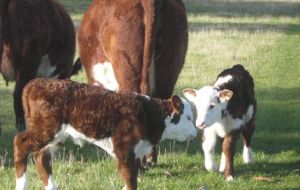MercoPress. South Atlantic News Agency
Meat from offspring of cloned cows consumed in UK triggers controversy
 Guess which offspring are from cloned cows
Guess which offspring are from cloned cows Meat from the offspring of a cloned cow was eaten in the UK last year, the Food Standards Agency has said. Two bulls from the embryos of a cow cloned in the US were bought by a farm near Nairn in the Highlands, and meat from one was sold to consumers.
Farmer Steven Innes told the BBC he had done nothing wrong and the animal had authorisation to enter the food chain.
FSA chief Tim Smith said he had no safety concerns but any suppliers would require approval under European law. The FSA said it had “traced two bulls born in the UK from embryos harvested from a cloned cow in the US”.
The first was slaughtered in July 2009 and its meat entered the food chain. The second was slaughtered on 27 July 2010, but its meat was stopped from entering the food chain.
However, Mr Smith told BBC Radio 4's Today programme his organisation did not know how many other embryos from cloned animals may have been imported into the UK.
Mr Innes, who runs Newmeadow Farm with his father, said he had bought the two bulls in February 2008.
“We investigated whether this was legal at the time and understood that there was no issue,” he said. “We acted in good faith throughout and have been fully compliant with the relevant authorities.”
Mr Innes said he used the bulls to sire 100 cows and both had government passports authorising them to enter the food chain. The cows are still on the farm and have not been used for milk production.
Highland Council has confirmed that it sent two food hygiene officials to Newmeadow Farm to investigate. The BBC has learned that the bull slaughtered in 2009 was reared on a farm in Albrighton in Shropshire before being sold on privately.
US biotechnology companies are cloning animals that give high yields of milk and meat to use as breeding stock. In 2008, the Food and Drug Administration in the US said meat and milk from cloned animals were safe for human consumption, and Professor Hugh Pennington, an expert on food safety from Aberdeen University, told the BBC he agreed with that assessment.
“People are concerned about playing God and that kind of thing... rather than producing products which are dangerous to eat,” he said. “There's absolutely no evidence for that, and I've got no expectation that any such evidence will ever emerge.”
At present, foodstuffs, including milk, produced from cloned animals must pass a safety evaluation and gain authorisation under so-called novel foods regulations before they are marketed in Europe.
The FSA said it had not been asked to consider any such cases, but Mr Smith said that despite having a “first-class cattle tracing scheme” in place, the system was not perfect.
“It's a bit like the police being there and being an efficient service and us expecting no crime. It's inevitable that however good the system is, it ultimately relies on the honesty of the people who are participating in the chain.
”So it means that every farmer, every breeder, every processor has to come clean and tell us what it is they're actually doing. It's impossible for us to stand by each animal and watch what happens to it throughout its life cycle.“
Mr Smith said it was ”inconceivable“ that those involved with the two bulls identified could have been unaware that their actions should have been brought to the attention of the authorities.
Scottish Environment Secretary Richard Lochhead said consumers ”deserve to know the origin of all foods they purchase“ and he was ”concerned to learn that the offspring of these animals have been reared in the UK for food production purposes without any authorisation from the Food Standards Agency“.
Earlier this week, a British dairy farmer said he used milk from a cow produced from a cloned parent, but UK dairy industry body DairyCo said it was ”confident“ no milk from such animals had entered the human food chain.
Peter Stevenson, from campaign group Compassion in World Farming, said cloning was ”at the sharp end of the inhumane selective breeding processes that are often involved in the intensive production of meat and dairy products“.
”Many animals suffer in the pursuit of higher yields because they are being stretched to the limits of their physical capacity,“ he added.
David Bowles, from the RSPCA, which wants cloning banned, said: ”The Food Standards Agency and the regulators and the government had no idea that any animal meat or animal milk had gone into the food chain.
“So it's really about showing there's transparency and that customers can trust what they go into shops to buy and at the moment that is in doubt.”
In 2008, the European Food Safety Authority said “no clear evidence” had emerged to suggest any food safety differences between food products from clones or their offspring compared to products from conventionally bred animals.
“But we must acknowledge that the evidence base, while growing and showing consistent findings, is still small,” it added.
Last month Members of the European Parliament voted in favour of a law that would ban cloned meat and other animal products in the European food supply. The legislation faces a next stage of consideration in September before it could become EU law.




Top Comments
Disclaimer & comment rulesCommenting for this story is now closed.
If you have a Facebook account, become a fan and comment on our Facebook Page!